Home Tags Posts tagged with "recep tayyip erdogan"
recep tayyip erdogan
General Ilker Basbug, Turkey’s former armed forces chief, has been jailed for life for plotting to overthrow the government, after five years of trials involving officers, lawyers, writers and journalists.
Gen. Ilker Basbug was among dozens of people convicted of involvement in the so-called Ergenekon plot.
Critics of PM Recep Tayyip Erdogan have accused him of staging show trials to eliminate his enemies.
His supporters say the trials have pushed the military out of politics.
Verdicts are being read out one by one at a specially constructed courtroom in Istanbul.
Twenty-one people have been acquitted and some 40 convicted so far, including at least one journalist and a police chief.
Ilker Basbug, who led the military between 2008 and 2010, had rejected all the charges against him.
The plot allegedly aimed to topple the government led by Recep Tayyip Erdogan’s Justice and Development Party (AKP).
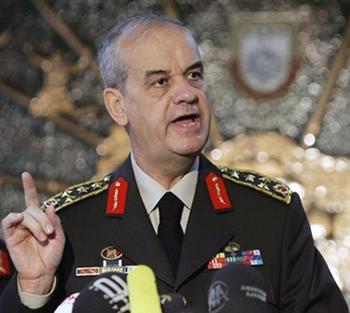
General Ilker Basbug, Turkey’s former armed forces chief, has been jailed for life for plotting to overthrow the government
The defendants faced charges ranging from membership of “Ergenekon”, an alleged underground terrorist network, to illegally possessing weapons and instigating an armed uprising against the AKP.
Prosecutors had demanded life imprisonment for Gen. Ilker Basbug and 63 others, including nine other generals.
The court is sitting at the high-security Silivri prison complex, west of Istanbul, where the general is being held.
Hundreds of riot police fired tear gas to disperse some 1,000 protesters who were marching outside the courthouse, reports say.
The case is being seen as a key test in PM Recep Tayyip Erdogan’s showdown with secularist and military opponents.
Since Recep Tayyip Erdogan came to power in 2002, hundreds of military officers – serving or retired – have been arrested.
Critics say there is little evidence for the charges and accuse the government of trying to silence its secularist opponents.
Critics have complained that the Ergenekon investigation has focused on opponents of the AKP.
The government denies any such motive.
Turkey’s military has long seen itself as the guarantor of the country’s secular constitution.
It staged three coups between 1960 and 1980 and has a history of tension with the AKP.
The AKP is considered a successor to the Welfare Party, an Islamist party that led a 1996-97 government forced to resign by an army-led campaign.
[youtube Ih_z3jUQcxI]
Turkey’s PM Recep Tayyip Erdogan has threatened legal action against British newspaper Times for publishing an open letter criticizing his handling of recent protests.
Recep Tayyip Erdogan accused the Times of “renting out its pages for money”.
Hollywood celebrities and academics were among those who signed the letter this week accusing Turkey’s government of “dictatorial rule”.
A row over a park in Istanbul last month triggered widespread anti-government protests.
At least four people were killed and thousands more injured as police cracked down on demonstrators who accused Recep Tayyip Erdogan of becoming increasingly authoritarian.
“The press wants to throw mud to see if it sticks,” Recep Tayyip Erdogan told reporters in comments broadcast on Turkey’s NTV channel.
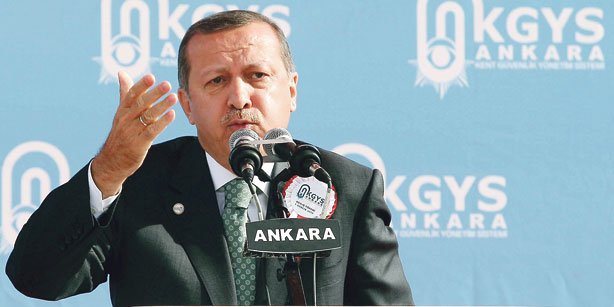
Turkey’s PM Recep Tayyip Erdogan has threatened legal action against British newspaper Times for publishing an open letter criticizing his handling of recent protests
“The Times is renting out its own pages for money. This is the Times’ failing. We will pursue legal channels regarding the Times.”
Recep Tayyip Erdogan said those who signed the letter – taken out as an full-page advertisement – had “rented out their thoughts” and did not genuinely support democracy.
“If they truly believed in democracy, they couldn’t have displayed such a lack of character to call the leader of a party that won 50% of the vote a dictator,” the prime minister said.
The Times has so far not commented on the remarks.
The open letter was signed by 30 people including Turkish pianist Fazil Say, film stars Sean Penn and Susan Sarandon, film director David Lynch and British historian David Starkey.
They condemned the crackdown on anti-government protesters and compared giant pro-government rallies – organized by Recep Tayyip Erdogan’s AKP party to counter the protests – to the huge rallies staged in Adolf Hitler’s Nazi Germany.
The wave of unrest in Turkey was sparked by demonstrations against controversial plans to redevelop Istanbul’s Gezi Park.
Turkish authorities’ heavy-handed response sparked anti-government protests nationwide.
[youtube QMY9gjgbTMo]
Turkish riot police have fired tear gas and water cannon at protesters trying to enter Istanbul’s Gezi Park that was the focus of last month’s anti-government protests.
Istanbul’s governor reopened Gezi Park – next to Taksim Square – to the public earlier on Monday, but shut it again after protest leaders called a rally.
Gezi Park had been shut since June 15, when police ejected people occupying it in protest at redevelopment plans.
Turkish authorities’ response to the protest sparked nationwide unrest.
Four people were killed and thousands more were injured as police cracked down on anti-government demonstrators, who accused PM Recep Tayyip Erdogan of becoming increasingly authoritarian.
Hundreds of people flocked to Gezi Park on Monday afternoon after Istanbul governor Huseyin Avni Mutlu declared it open once again.
Huseyin Avni Mutlu said staff had tried to improve the park while it was sealed off, planting additional trees and shrubs and replacing damaged grass.
But, in a clear warning to protesters, he also warned that it was no place for “forums, occupations or marches”.
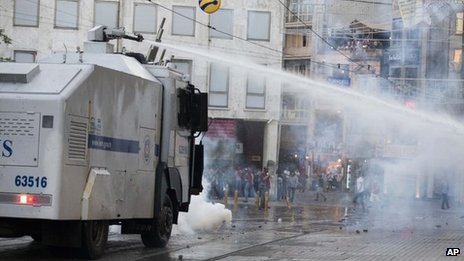
Turkish riot police have fired tear gas and water cannon at protesters trying to enter Istanbul’s Gezi Park
“Blocking the parks, making them areas for demonstrations, preventing children, elderly and [others] from using these areas and turning this into a security problem – we would never ever allow that,” he told reporters.
Taksim Solidarity, a group of political parties and non-governmental organizations, subsequently called a public meeting in the park at 19:00 (16:00 GMT), prompting the authorities to close it after only three hours.
Dozens of people were forced to leave by police, who used their shields to eject some who resisted.
Officers then used tear gas and water cannon to break up a crowd of several thousand people marching along Istanbul’s main shopping street towards Taksim Square, according to the Reuters news agency.
On Saturday, police prevented thousands of people trying to enter Gezi Park as part of a rally called by Taksim Solidarity to serve notice to the authorities of a court decision that annulled the redevelopment plan.
An administrative court said locals had not been consulted sufficiently about replacing the park with a replica of an Ottoman-era military barracks and a mosque, and that the work would not serve the public.
However, the ruling is not final and the government is expected to appeal.
[youtube _cHLhY-IOIU]
German proposal to postpone further EU membership talks with Turkey for about four months has been backed by EU foreign ministers.
The EU-Turkey talks had been scheduled to resume this Wednesday.
But Germany, Austria and the Netherlands have criticized Turkey’s crackdown on anti-government protests.
Turkish police arrested at least 20 people in the capital Ankara on Tuesday, suspected of attacking police during the recent unrest in Istanbul.
Turkish media say the suspects are also accused of belonging to a “terror organization”.
Germany’s Foreign Minister Guido Westerwelle played down tensions with Turkey on Tuesday, saying he had had a “really good, constructive” discussion with his Turkish counterpart Ahmet Davutoglu on Monday evening.
Ahmet Davutoglu was upbeat, saying he saw “no obstacle” to reopening Turkey’s talks with the EU eventually.
Turkey began accession negotiations with the EU in 2005, at the same time as Croatia, which will join the 27-nation bloc next week.
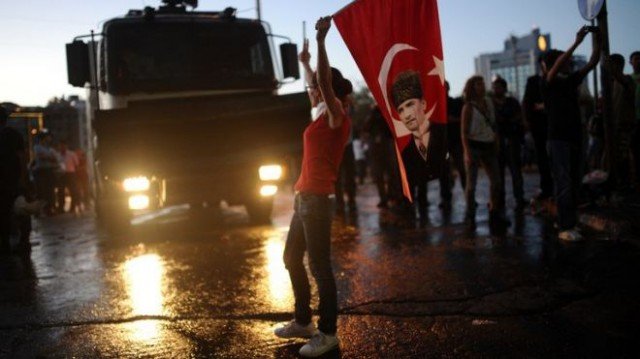
Germany, Austria and the Netherlands have criticized Turkey’s crackdown on anti-government protests
But Turkey’s talks have been stalled for three years, and an EU Commission report on Ankara’s progress last October highlighted numerous concerns about democracy and human rights.
Like all would-be member states, Turkey has to satisfy a detailed set of EU requirements, called the acquis. Last year Turkey received 856 million euros ($1.1 billion) in EU aid to help it make the necessary institutional reforms.
Germany’s Chancellor Angela Merkel wants Turkey to have a privileged partnership with the EU, rather than full EU membership. She hopes to win re-election in September – before the talks with Turkey resume.
Last week Germany summoned the Turkish ambassador in a row over Turkey’s membership bid.
The two countries had earlier exchanged angry words in connection with the Turkish police action against demonstrators. Turkish police have used water cannon and tear gas against protesters – a crackdown widely seen to have fuelled anger against PM Recep Tayyip Erdogan’s government.
Initially peaceful protesters had staged a sit-in aimed at stopping a development project in Gezi Park, in the heart of Istanbul.
EU foreign ministers have now agreed to resume accession negotiations with Turkey, but only after a progress report on its EU bid is presented in October, diplomats say.
The next policy area to be negotiated is Chapter 22, dealing with regional policy.
Out of 35 chapters in total only 13 have been opened since Turkey’s negotiations began, and eight have been frozen because of Turkey’s dispute with Cyprus. So far, only one chapter – on science and research – has been closed.
The Republic of Ireland chaired the foreign ministers’ talks in Luxembourg on Tuesday. Irish Foreign Minister Eamon Gilmore said “we agreed to open a new chapter in accession negotiations with Turkey” and “the Inter Governmental Conference with Turkey will take place later this year”. The conference is the forum for Turkey’s membership bid.
“While we have been disturbed by the reaction to the recent peaceful protests in Turkey, I believe that the EU accession process is the most effective tool we have in influencing the reform agenda in Turkey. EU-inspired reforms have facilitated the increasing space for peaceful protest and dissenting voices,” Eamon Gilmore said.
“The protests have also shown that Turkey needs further reform. Moving ahead with the EU accession process by opening Chapter 22 will, I believe, allow the EU to continue contributing to shaping the direction of future reform in Turkey.”
[youtube Zej-5p04NH0]
The Turkish government has announced it could use the army to end nearly three weeks of unrest by Gezi Park protesters in Istanbul and other cities.
The government would use “all its powers” and the armed forces if necessary, Deputy PM Bulent Arinc said on state-run television.
It is the first time the Islamist-rooted ruling party has raised the prospect of deploying the armed forces.
The issue is sensitive as the army is seen as a bastion of secularism.
PM Recep Tayyip Erdogan told hundreds of thousands of supporters at a rally in Istanbul on Sunday that the protesters were manipulated by “terrorists”.
Trade unions have called a strike to protest against the police crackdown on demonstrators which has seen some 500 people arrested.
Medical officials estimate that 5,000 people have been injured and at least four killed in the unrest.
The protests began on 28 May against a plan to redevelop Istanbul’s Gezi Park, on the city’s central Taksim Square, but it snowballed into nationwide anti-government protests after the perceived high-handed response of the authorities under their three-term prime minister.
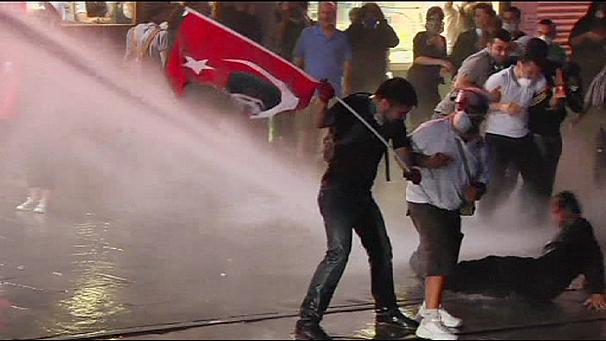
The Turkish government has announced it could use the army to end nearly three weeks of unrest by Gezi Park protesters in Istanbul and other cities
Bulent Arinc told state-run TV that “the innocent demonstrations that began 20 days ago” had “completely ended”.
Any further demonstrations would be “immediately suppressed”, he added.
“Our police, our security forces are doing their jobs,” he said.
“If it’s not enough then the gendarmes will do their jobs. If that’s not enough… we could even use elements of the Turkish armed forces.”
The deployment of gendarmes – a military unit under control of the interior ministry in peacetime – shocked some protesters in Istanbul this weekend.
In a separate interview, Interior Minister Muammer Guler stressed that he had not called on the army to help police the protests.
But he argued that the use of the gendarmerie was “quite normal”, the Turkish newspaper Hurriyet reports.
Bloggers reacted with skepticism to news that the army might be deployed.
“And this coming from the same people who always claim they liberated Turkish democracy from army intervention,” one wrote.
In Turkey’s capital, Ankara, riot police could be seen facing off with trade union activists on Monday.
Police officers used megaphones to order workers to stop their march towards the central Kizilay district, reports Reuters news agency.
“Those of you on the streets must stop blocking the streets,” they said.
“Do not be provoked. The police will use force.”
Union marches were also being planned for Istanbul, where police evicted protesters from their camp in Gezi Park over the weekend.
The Confederation of Public Workers’ Unions (KESK) and Confederation of Progressive Trade Unions (DISK), along with three professional organizations, announced a one-day work stoppage to demand an end to “police violence”.
[youtube hPcwMjSPAjU]
Turkey’s Prime Minister Recep Tayyip Erdogan has rallied tens of thousands of supporters in Istanbul, telling them it was his duty to clear a city square that has been the focus of anti-government unrest.
Recep Tayyip Erdogan denied he was a dictator, criticized foreign media and vowed to “identify one by one those who have terrorized the streets”.
Unrest has continued in Ankara and Istanbul, with police firing tear gas.
Two trade union groups have called a one-day nationwide strike for Monday.
Baki Cinar, a spokesman for one of the groups, Kesk, told AFP news agency: “Our demand is for police violence to end immediately.”
The protests in Turkey began on May 28 against a plan to redevelop Istanbul’s Gezi Park, but snowballed into nationwide anti-government protests after the perceived high-handed response of the authorities under their three-term prime minister.
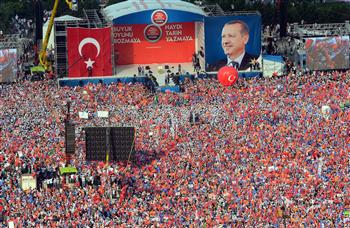
Turkey’s Prime Minister Recep Tayyip Erdogan has rallied tens of thousands of supporters in Istanbul
Medical officials estimate that 5,000 people have been injured and at least four killed since the protests began.
The rally in support of Recep Tayyip Erdogan and his Islamist-rooted ruling party, the Justice and Development Party (AKP), was held in the Kazlicesme district, about 6 miles from central Istanbul.
Recep Tayyip Erdogan defended Saturday’s police action to clear Istanbul’s Taksim Square and nearby Gezi Park, saying: “I said we were at an end. That it was unbearable. Yesterday the operation was carried out and it was cleaned up. It was my duty as prime minister.”
He criticized the international press and social media for the coverage of the unrest, urging them to be ethical and honest.
“If the international media want a picture of Turkey, the picture is here,” he said.
Recep Tayyip Erdogan denied being an authoritarian leader and said the protests had been manipulated by “terrorists”.
He said: “They say <<you are too tough>>, they say <<dictator>>. What kind of a dictator is this who met the Gezi Park occupiers and honest environmentalists. Is there such dictator?
“The attitude across Turkey with the pretext of Taksim’s Gezi Park is not sincere. It is nothing more than the minority’s attempt to dominate the majority… We could not have allowed this and we will not allow it.”
Gezi Park ctivists have called on protesters to return to Taksim Square but it is now cordoned off by police.
There have been sporadic clashes in surrounding areas, with police firing tear gas and water cannon.
Istanbul’s governor, Huseyin Avni Mutlu, said the public would not be allowed into the square, adding that it would be “unsafe” for protesters to try to gather.
One protester, Mey Elbi, said the demonstrators would not give up.
She told AFP: “We’re angry, this is not over. The world has seen that together, we can stand up to Tayyip.”
Unrest spread to other parts of Istanbul.
Protesters ripped up paving stones near the Galata bridge and police fired water cannon in the upmarket Nisantasi district.
As night fell, barricades were being erected in a number of city neighborhoods as youths faced off against police.
Some 1,000 riot police officers earlier arrived at Ataturk Airport from regions as far away as Diyarbakir and Sirnak, local media reported, to try to curb the Istanbul unrest.
Riot police could be seen leaving the city’s airport and getting on to coaches bound for the city.
At least 350 police on duty at the airport were also deployed to the city centre in case of possible clashes, Turkey’s Dogan news agency reports.
Police also fired tear gas and water cannon to clear demonstrators in Ankara’s Kizilay Square on Sunday afternoon.
At least four people were injured.
[youtube XkyvXJFf7SA]
Gezi Park protesters have clashed with Turkish police in Istanbul, after riot squads used tear gas and water cannon to eject demonstrators from the park.
The protesters quickly fled the park, but later erected barricades across nearby streets and lit bonfires.
Witnesses said it was one of the worst nights of unrest since the park was occupied 18 days ago.
Police blocked off the Bosphorus Bridge to stop demonstrators reaching Taksim Square, where the park is located.
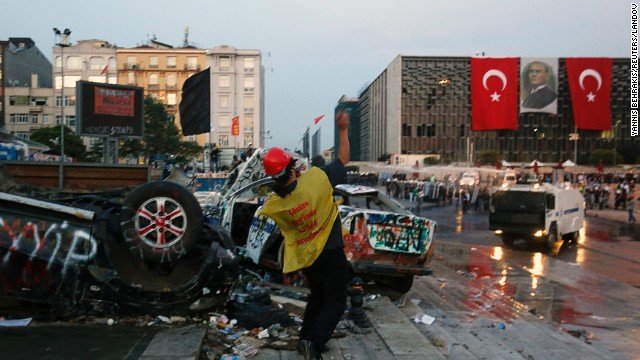
Gezi Park protesters have clashed with Turkish police in Istanbul, after riot squads used tear gas and water cannon to eject demonstrators from the park.
Clashes continued into Sunday morning in the streets around the square, eyewitnesses say. On the square itself, bulldozers went to work, clearing away the protesters’ abandoned barricades.
Thousands of people also took to the streets of the capital, Ankara, to express support for the protests.
The Confederation of Public Workers’ Unions (KESK) also said it would call a nationwide strike on Monday, while another union grouping is deciding whether to join the action.
Medical officials estimate that 5,000 people have been injured and at least four killed since protests began in earnest on May 31.
PM Recep Tayyip Erdogan is due to hold a rally in Istanbul later on Sunday.
The protests began as a local protest against a plan to redevelop Gezi Park, but snowballed into nationwide anti-government protests after the perceived high-handed response of the authorities.
[youtube F8rphu8nj1Y]
Turkish riot police have moved to clear the protest camp in Istanbul’s Gezi Park, using tear gas and water cannon.
Police began dismantling the tents that protesters had put up in the park.
The move came hours after PM Recep Tayyip Erdogan warned protesters to evacuate the area ahead of a rally by his AK party on Sunday.
Plans to redevelop the park sparked a wave of broader anti-government unrest and protesters had vowed to stay there until their demands were met.
In a show of overwhelming force, police advanced into the park wearing riot shields and gas marks.
Most of the protesters left of their own accord to avoid getting hurt, with some regrouping in nearby streets.
Local residents took to their balconies or leant out of windows banging pots and pans, while car drivers sounded their horns in support of the protesters, Reuters news agency reports.
Some of the protesters were reportedly receiving medical attention, several of them retreating into a nearby hotel.
Istanbul Governor Huseyin Avni Mutlu said 29 people had been injured in the raid, but none seriously.
Huseyin Avni Mutlu said only “marginal groups” had remained in the park.
“I won’t give up,” protester May Elbi told AFP.
“We’re angry, this is not over. The world has seen that together, we can stand up to Tayyip.”
There have been reports of fresh confrontations in Istanbul after the clearing of the park, with police again using tear gas to disperse protesters.
In the capital Ankara, thousands of people came out onto the streets to chant anti-government slogans.
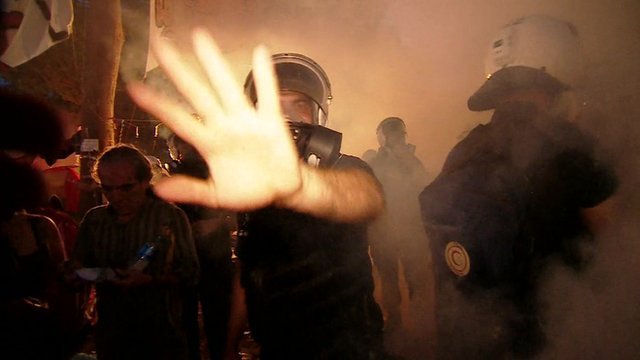
Turkish riot police have moved to clear the protest camp in Istanbul’s Gezi Park, using tear gas and water cannon
Earlier, in a speech in Ankara, Recep Tayyip Erdogan told tens of thousands of AK party supporters: “If Taksim Square is not evacuated, this country’s security forces will know how to evacuate it.”
“Staying there [in Gezi Park] makes no sense anymore as the matter is now in the hands of the courts,” he told tens of thousands of cheering supporters.
“Nobody can intimidate us. We take no orders or instruction from anyone but God,” the prime minister added.
He also dismissed the wave of demonstrations as part of an organized plot against him.
One protest group responded to Recep Tayyip Erdogan’s speech by calling for another mass rally in Taksim Square. Istanbul is also set to host an AK party rally on Sunday,
On May 31, a crackdown on environmentalists in Gezi Park provoked protests across Turkey against the police’s actions and against Recep Tayyip Erdogan’s government.
On Saturday, the protesters vowed to stay there, despite a promise by Recep Tayyip Erdogan to halt the development plan for the park until a court ruling on the issue.
Last month, an Istanbul court issued an initial injunction against the plan to cut down trees in the park to make way for a shopping centre and replica 18th-Century military barracks. The government has appealed against the ruling.
Recep Tayyip Erdogan’s offer was presented as a major concession. But after discussions in Gezi Park on Friday night, the protesters said their movement was more than just a conservation protest and vowed to stay on.
Five people have died and thousands have been injured since the protests began.
Demonstrators have accused Recep Tayyip Erdogan’s government of becoming increasingly authoritarian and of trying to impose conservative Islamic values on a secular state.
The police crackdown on protesters in Istanbul, Ankara, and other towns and cities has drawn international concern, especially from Europe.
[youtube 4SkfZRRg9FQ]
[youtube eLJPPmmMmTc]
Turkish Gezi Park activists have vowed to continue occupying Istanbul’s park.
Their defiant statement came despite PM Recep Tayyip Erdogan’s promise to halt a redevelopment plan which sparked two weeks of anti-government unrest.
Recep Tayyip Erdogan’s offer was presented as a major concession.
But after all-night discussions in Gezi Park, the protesters said their movement was bigger than a simple conservation protest.
“We will continue our resistance in the face of any injustice and unfairness taking place in our country,” the Taksim Solidarity group, seen as most representative of the protesters, said.
“This is only the beginning.”
Meanwhile, in the capital Ankara, riot police again deployed tear gas and water cannon to disperse demonstrators overnight. About 30 protesters were reported to have been arrested.
Later on Saturday, supporters of Recep Tayyip Erdogan’s ruling Justice and Development Party (AKP) are expected to take to the streets of the capital for an election rally to show support for the embattled premier.
The prime minister’s offer to stop the Gezi Park redevelopment until a court ruled on its legality was his first conciliatory gesture since the challenge to his Islamist-backed government began.
He had previously taken a tough line on the protests, branding the demonstrators “extremists” and “looters”. He said the unrest was being encouraged by foreign forces to undermine Turkey and its economy.
“Young people, you have remained there long enough and delivered your message…. Why are you staying?” Recep Tayyip Erdogan said in a speech broadcast live on television in which he made his offer.
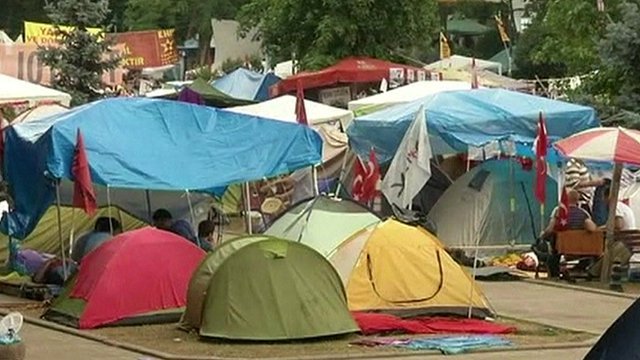
Turkish Gezi Park activists have vowed to continue occupying Istanbul’s park
The contested Gezi Park is a rare patch of green in Turkey’s biggest city.
Last month, an Istanbul court issued an initial injunction against the plan to cut down trees in the park to make way for a shopping centre and replica 18th-Century military barracks. The government has appealed against the ruling.
The project was the initial spark for the protests, which then broadened into anti-government demonstrations in several cities which saw violent clashes between police and demonstrators.
Five people have died and thousands have been injured since the protests began on 31 May, spreading to the adjacent Taksim Square a day later and then to other towns and cities across Turkey.
Protesters have accused Recep Tayyip Erdogan’s government of becoming increasingly authoritarian and of trying to impose conservative Islamic values on a secular state.
The police crackdown on protesters in Istanbul, Ankara, and other towns and cities has drawn international concern, especially from Europe.
And Turkish broadcasters have been heavily criticized for not covering the protests in their early days.
The BBC has suspended its partnership with Turkish broadcaster NTV following its decision not to transmit the BBC programme Dunya Gundemi (World Agenda).
The dropping of the programme came after NTV had apologized to its staff and viewers for not covering the protests when they first began.
Turkey protest timeline:
May 31: Protests begin in Gezi Park over plans to redevelop one of Istanbul’s few green spaces
June 3: Protesters establish camps with makeshift facilities from libraries to food centres
June 4-10: Protests widen into show of anti-government dissent in towns and cities across Turkey; clashes between police and demonstrators
June 11-12: Night of clashes see riot police disperse anti-government demonstrators in Taksim Square, which adjoins Gezi Park; camps in the park remain
June 13: PM Recep Tayyip Erdogan issues a “final warning” to protesters to leave Gezi Park
June 14: Government agrees to suspend Gezi Park redevelopment plans until a court rules on the issue, PM holds talks with members of a key protest group
June 15: Protesters vow to continue occupying Gezi Park
[youtube 6I2aZBEraHo]
Turkish Prime Minister Recep Tayyip Erdogan has held talks with members of Taksim Square protest group, hours after issuing a “final warning” to demonstrators.
Tayfun Kahraman from the umbrella group Taksim Solidarity described the outcome as “positive”.
A meeting would be called in Istanbul’s Taksim Square on Friday “to allow citizens to make up their own mind”.
Taksim Solidarity is opposed to the redevelopment of Gezi Park, the issue that sparked the unrest.
Clashes between police and protesters in the park and nearby Taksim Square have continued for nearly two weeks.
Activists have said they will not leave until the government abandons plans to redevelop the park.
The meeting in the capital, Ankara, was the first time Recep Tayyip Erdogan had met protest organizers directly.
It was earlier described as a “last-ditch” attempt to find a solution after two weeks of anti-government protests.
Speaking after Thursday night’s meeting, government spokesman Huseyin Celik said a public vote would be held on the future of Gezi Park.
“The park should not be a place where people live for 24 hours,” he said.
“The environmentalists should leave. We will ask everyone in Istanbul what they think. Anyone who does not want a vote cannot speak of democracy.”
The spokesman added that allegations of “excessive use of force” by the police would be investigated.
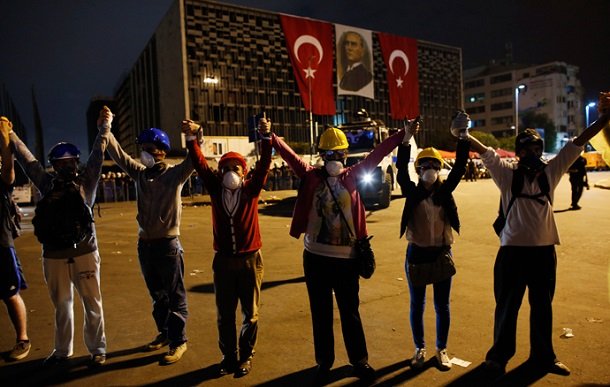
Turkish Prime Minister Recep Tayyip Erdogan has held talks with members of Taksim Square protest group, hours after issuing a “final warning” to demonstrators
Meanwhile Tayfun Kahraman said no action would be taken by the government regarding Gezi Park “until all lines of justice are exhausted”.
“This is positive and should be received positively,” he said.
His Taksim Solidarity group is seen as the most representative body of the demonstrators, many of whom are still encamped in Gezi Park.
“We will stay in Gezi Park with all our demands and sleeping bags,” the group said in an earlier statement.
“We did not suffer through the attacks… so that a referendum could take place.”
Gezi Park is a rare patch of green in Turkey’s biggest city, and has been the focus of public anger.
Plans to redevelop it into a shopping centre were the initial spark for the protests, which then broadened into anti-government demonstrations in several cities.
Protesters have accused Recep Tayyip Erdogan’s government of becoming increasingly authoritarian and trying to impose conservative Islamic values on a secular state.
Recep Tayyip Erdogan has taken a tough line on the protests, branding the demonstrators as “extremists” and “looters”. He has said the unrest was being encouraged by foreign forces to undermine Turkey and its economy.
Speaking at a meeting of his ruling AK Party (AKP) in Ankara earlier on Thursday, Recep Tayyip Erdogan said: “Our patience is at an end. I am making my warning for the last time.”
“I say to the mothers and fathers, please take your children in hand and bring them out,” he added, going on to say that the park belonged not “to occupying forces but to the people.”
Some of those camped in the park have been waiting for news from city governor Huseyin Avni Mutlu, who has been assuring them for several days that police will not intervene, while urging them to leave so that “police can tackle marginal groups”.
Several riot vehicles are still on standby in Taksim – a sign that police have no intention of abandoning the square they stormed on Tuesday – though crowds gathered there once more on Thursday evening.
The police crackdown on protesters has drawn international concern, especially from Europe.
On Thursday, the European Parliament passed a non-binding resolution that “deplores the reactions of the Turkish Government and of Prime Minister Erdogan, whose unwillingness to take steps towards reconciliation, to apologize or to understand the reactions of a segment of the Turkish population have only contributed to further polarization”.
Recep Tayyip Erdogan angrily dismissed the resolution shortly before it was passed.
Also on Thursday, White House spokesman Jay Carney said the US expected Turkish authorities to uphold the “fundamental freedoms” of expression and assembly.
Five people have died and thousands have been injured since the protests began in Gezi Park on May 31, spreading to Taksim Square a day later.
[youtube DLAepKntzZ8]
Turkey’s PM Recep Tayyip Erdogan has issued a “final warning” to protesters to leave Gezi Park in Istanbul.
“Our patience is at an end. I am making my warning for the last time,” he said.

Recep Tayyip Erdogan has issued a “final warning” to protesters to leave Gezi Park in Istanbul
Clashes between police and protesters in the park and adjoining Taksim Square have continued for nearly two weeks.
Activists have said they will not leave Gezi Park until the government abandons plans to redevelop it. Recep Tayyip Erdogan has promised a local vote on its future.
Such a plebiscite would not be legally binding but Recep Tayyip Erdogan implied he would honor its outcome.
“I say to the mothers and fathers please take your children in hand and bring them out,” Recep Tayyip Erdogan declared.
“We cannot wait any more because Gezi Park does not belong to occupying forces but to the people.”
Recep Tayyip Erdogan’s speech at a meeting of his ruling AK Party in the capital, Ankara, received a standing ovation.
[youtube ZpEvNGU1xjk]
[youtube Yy3OkrRWcVI]
Huseyin Celik, deputy chairman of Turkey’s ruling AK party, says it is open to the idea of a referendum on controversial plans to redevelop Istanbul’s Gezi Park.
Huseyin Celik hoped the “gesture of goodwill” would clear the area.
But he warned: “Those… who seek to provoke and remain in the park will face the police.”
Police treatment of protesters campaigning against the redevelopment triggered broader demonstrations that have continued since May 31.
“We might put it to a referendum… In democracies only the will of the people counts,” Huseyin Celik said.
“We think that after this gesture of goodwill, people will decide to go home.”
Huseyin Celik’s comments represent the first time that the AK party has openly discussed letting voters decide what happens to the park. Demonstrators have remained there throughout the protests.
There has been a mixed reaction among protesters on Twitter, with some welcoming the proposal and others mistrustful of the authorities.
Turkish media reported on Wednesday that PM Recep Tayyip Erdogan had told the interior minister to end the protests in Gezi Park within 24 hours.
More than 20 opposition MPs have gone to the park to try to prevent any police intervention.
Senior European diplomats have expressed strong concern over Turkey’s response to the protests.
Hundreds of protesters have now gathered in Taksim Square, next to the park, although the square is about half as full as it was on Tuesday.
Police stood back along the edges of the square, which had been clear during the day after a series of violent clashes between police and protesters on Tuesday and overnight.
During the day, Recep Tayyip Erdogan met 11 activists, but protest leaders dismissed the meeting.

Turkey’s AK party is open to the idea of a referendum on controversial plans to redevelop Istanbul’s Gezi Park
In both Istanbul and the capital, Ankara, on Wednesday thousands of lawyers left court in their black robes to march through the streets, protesting against the treatment of their colleagues during demonstrations.
Dozens of lawyers were briefly held in Istanbul on Tuesday as they voiced their opposition to police action to clear the square.
“Our friends who had been detained in Istanbul were taken under custody just because they were reading a press release,” said one of the lawyers in Ankara, Mehmet Toker.
“We are here to defend freedom of speech.”
Demonstrators accuse Recep Tayyip Erdogan of becoming increasingly authoritarian and trying to impose conservative Islamic values on a secular state.
“Oppression has been going on for months,” said another lawyer, Ege Inal.
“The government is exactly like the ones that they have been criticizing. That is why we are here.”
Late in the afternoon, Recep Tayyip Erdogan met a group of 11 people – including artists, architects and a social media specialist – to discuss the situation in Gezi Park.
But those in the park and Taksim Solidarity, an umbrella group seen as most representative of the protesters, said the activists did not speak for them.
“As police violence continues mercilessly… these meetings will in no way lead to a solution,” a statement from Taksim Solidarity said.
Recep Tayyip Erdogan had earlier said protests would no longer be tolerated, dismissing protesters as “looters”.
Turkish President Abdullah Gul, who has taken a more conciliatory line than PM Recep Tayyip Erdogan, said authorities should listen to protesters’ grievances.
“If people have objections, then to engage in a dialogue with these people, to hear out what they say is no doubt our duty,” he told reporters.
European Foreign Policy Chief Catherine Ashton said the unrest represented a “key moment” for Turkey, and a “chance for it to renew its commitment to European values”.
The Turkish Human Rights Foundation said more than 620 people had been injured in Tuesday’s police crackdown.
Since the protests began, four people have been killed, including one policeman and some 5,000 protesters as well as hundreds of police officers are estimated to have been injured.
Italian Foreign Minister Emma Bonino said the unrest was the “first serious test for the endurance of democracy in Turkey and its accession to Europe”, while German Foreign Minister Guido Westerwelle expressed his concern in a statement.
“We expect Prime Minister Erdogan to de-escalate the situation, in the spirit of European values, and to seek a constructive exchange and peaceful dialogue,” he said.
[youtube -Pp8gArdkXs]
Turkish police clashed with protesters in Istanbul’s Taksim Square, despite a warning from PM Recep Tayyip Erdogan that he would not show “any more tolerance”.
Police firing tear gas cleared the square on Tuesday morning, but protesters returned later in the day.
Istanbul’s governor, Huseyin Avni Mutlu, said operations would go on night and day to clear the square.
Protests began 12 days ago over the redevelopment of nearby Gezi Park.
The protests then widened, with demonstrators accusing Recep Tayyip Erdogan’s government of becoming increasingly authoritarian and trying to impose conservative Islamic values on a secular state.
On Tuesday evening, protesters in Taksim Square lit bonfires, set off fireworks and threw stones at police.
Officers responded by firing tear gas, but crowds still remain in the square.

Turkish police clashed with protesters in Istanbul’s Taksim Square, despite a warning from PM Recep Tayyip Erdogan
“We will continue our measures in an unremitting manner, whether day or night, until marginal elements are cleared and the square is open to the people,” Huseyin Avni Mutlu said in televised comments.
But he also said the action would “be conducted with care, in front of our people’s eyes, in front of televisions and under the eyes of social media, with caution and in accordance with the law”.
Recep Tayyip Erdogan defended the police intervention on Tuesday, saying that an environmental movement had been hijacked by people who wanted to harm Turkey.
In a televised speech to members of parliament belonging to his Justice and Development Party (AKP) that was frequently interrupted by applause, he asked: “They say the prime minister is rough. So what was going to happen? Were we going to kneel down in front of these [people]?
“If you call this roughness, I’m sorry, but this Tayyip Erdogan won’t change.”
“To those who… are at Taksim and elsewhere taking part in the demonstrations with sincere feelings: I call on you to leave those places and to end these incidents and I send you my love.
“But for those who want to continue with the incidents I say: ‘It’s over.’ As of now we have no tolerance for them.”
Early in the day, police made loudspeaker announcements, telling protesters to withdraw from the square, before using water cannon, tear gas and rubber bullets to clear them.
Bulldozers were sent in to clear barricades and shelters.
They also removed protesters’ banners from a building overlooking the square, replacing them with the national flag and a portrait of the father of the Turkish state, Kemal Ataturk – who has also been used as a symbol by demonstrators.
The protests began on 31 May.
The Turkish Human Rights Foundation says four people have been killed, including one policeman.
Some 5,000 protesters have been treated for injuries or the effects of tear gas, while officials say 600 police have also been injured.
Protests have also occurred in the capital, Ankara, with smaller demonstrations in many other cities.
Police in Ankara have used water cannon and tear gas to break up demonstrations almost every night.
[youtube JO8Nhk9D1lw]
Riot police have entered Istanbul’s Taksim Square, where Turkish anti-government protesters have been staging demonstrations for close to two weeks.
Hundreds of officers have been using tear gas and water cannon to disperse activists.
The move comes after PM Recep Tayyip Erdogan agreed to meet the protest organizers on Wednesday.
The unrest was sparked by a police crackdown on a local protest over an Istanbul park.

Riot police have entered Istanbul’s Taksim Square, where Turkish anti-government protesters have been staging demonstrations for close to two weeks
The protests then widened, with demonstrators accusing Recep Tayyip Erdogan’s government of becoming increasingly authoritarian and trying to impose conservative Islamic values on a secular state.
Backed by armored vehicles, police wearing helmets and carrying shields gathered around the square early on Tuesday.
They then began to move past barricades erected by protesters.
According to correspondents, the move is a deliberate show of force.
The demonstrations are now in their 12th day, with activists controlling much of Taksim Square.
The unrest was sparked after police moved to suppress environmental protests over the redevelopment of Gezi Park, which is part of Taksim Square, on May 31.
More than 5,000 people have been injured and three people have died since the protests began.
[youtube pNdvoG2wHTk]
EU Enlargement Commissioner Štefan Füle has said in Istanbul that Turkey must investigate the excessive use of force by police against anti-government protesters.
Štefan Füle was speaking ahead of talks on Turkey’s ambition to join the EU.
In response, Turkish PM Recep Tayyip Erdogan said similar protests in Europe would be dealt with more harshly.
Turkey has seen a week of civil unrest sparked by a police crackdown on a local protest over an Istanbul park.
Štefan Füle and Recep Tayyip Erdogan were both speaking at a conference in Istanbul on Turkey’s relations with the EU.
The EU enlargement commissioner said the EU had no intention of giving up on Turkey’s accession, but Turkey had to maintain values of freedom and fundamental rights.
He urged a “swift and transparent” investigation and those responsible should be held to account.
“Peaceful demonstrations constitute a legitimate way for groups to express their views in a democratic society,” Štefan Füle said.
“Excessive use of force by police against these demonstrations has no place in such a democracy.”
In response, Recep Tayyip Erdogan accused the EU of double standards, saying police in Europe and the US used similar methods.
The Turkish government has acknowledged that police used excessive force against the original protest over the planned redevelopment of Gezi Park in Istanbul.
But they say the wider protest movement that ensued in cities across the country has been hijacked by extremists.
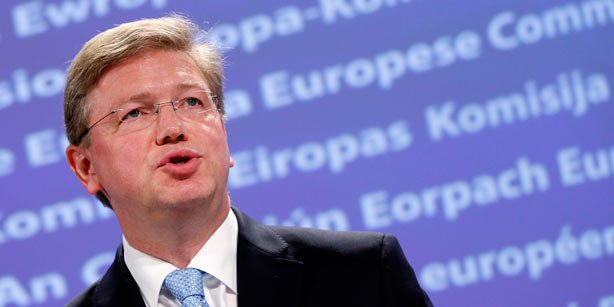
EU Enlargement Commissioner Štefan Füle asked Turkey to investigate the excessive use of force by police against anti-government protesters
Last night Recep Tayyip Erdogan called for an immediate end to the demonstrations, saying they bordered on illegality.
In a defiant speech to supporters on his return from a four-day tour off North Africa, he accused the protesters of looting and said they had lost democratic credentials.
Turkey’s hopes of EU membership will not be helped by the worst civil unrest for decades.
Turkey formally applied to join in 1987 and started accession talks in 2005.
Human rights concerns have always been an important obstacle to Turkey’s membership bid, along with the division of Cyprus and other issues.
But both France and Germany have recently softened their stance on Turkish accession.
On Thursday night Recep Tayyip Erdogan was welcomed back to Turkey by thousands of cheering supporters who waited at the airport to greet him.
He responded to calls for his resignation by referring to his election victory in 2011 when he took 50% of the vote.
“They say I am the prime minister of only 50%. It’s not true. We have served the whole of the 76 million from the east to the west,” he told the crowd.
It was the first major show of support for Recep Tayyip Erdogan following a week of protests in which his opponents have called for him to resign.
Four people, including a police officer, are reported to have died since the protests began, with thousands more hurt and hundreds arrested.
Interior Minister Muammer Guler has said that more than 500 police officers are among the injured.
The protesters accuse Recep Tayyip Erdogan’s government of becoming increasingly authoritarian and trying to impose conservative Islamic values on a secular state.
Recep Tayyip Erdogan’s Justice and Development Party (AKP) has governed Turkey since 2002, winning successive election victories.
Turkey’s PM Recep Tayyip Erdogan has called for protests across the country to end immediately.
At Istanbul airport Recep Tayyip Erdogan told crowds of supporters who were welcoming him home from a four-day North Africa tour that the protests bordered on illegality.
As he spoke, thousands of anti-government protesters were also rallying in Istanbul’s Taksim Square.
The unrest began as a local protest over a park in Istanbul but spiraled into nationwide demonstrations.
An estimated 10,000 supporters of Recep Tayyip Erdogan’s AKP party descended on the airport to welcome him home in the early hours of Friday.
Standing alongside his wife and government ministers on an open-top bus, Recep Tayyip Erdogan told the crowd: “These protests that are bordering on illegality must come to an end as of now.”
At times Recep Tayyip Erdogan was almost drowned out by the cheering and chanting of his supporters.
“We have never been for building tension and polarization, but we cannot applaud brutality,” he said.
Some of his supporters chanted: “Let us go, let’s crush Taksim.”
However, Recep Tayyip Erdogan urged them to “go home” peacefully.
“You have remained calm, mature and showed common sense,” he said.
“We’re all going to go home from here.”
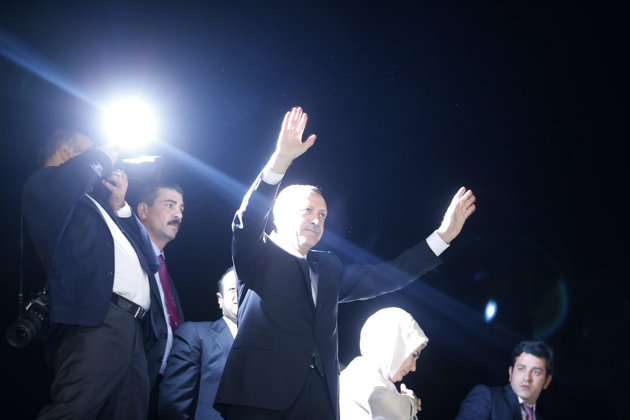
Turkey’s PM Recep Tayyip Erdogan has called for protests across the country to end immediately
Recep Tayyip Erdogan responded to calls for his resignation by referring to his election victory in 2011 when he took 50% of the vote.
“They say I am the prime minister of only 50%. It’s not true. We have served the whole of the 76 million from the east to the west,” he told the crowd.
It was the first major show of support for Recep Tayyip Erdogan following a week of protests in which his opponents have called for him to resign.
The divisions in Turkey look set to deepen in the days ahead and could be very dangerous indeed.
The original sit-in at Gezi Park last Friday spiraled into mass protests after police cracked down on activists defending the green space near Taksim Square from developers.
Correspondents in Taksim Square say the atmosphere is good-natured, with protesters dancing and chanting political slogans.
Many are part of a secular, well-educated middle class which feels that Turkey lacks a proper, free political culture.
One protester in the square, named as Deniz, told reporters: “He [Recep Tayyip Erdogan] cannot take the park, there is no way. You know what? He will cause a war inside the country. We will keep resisting.”
Protesters accuse Recep Tayyip Erdogan’s government of becoming increasingly authoritarian and trying to impose conservative Islamic values on a secular state.
His Justice and Development Party (AKP) has governed Turkey since 2002.
Speaking in Tunis earlier, Recep Tayyip Erdogan acknowledged that police had used “excessive force” against activists at the original sit-in. But he said that a small group was now manipulating what had started as an environmental protest.
“Among the protesters there are extremists, some of them implicated in terrorism,” he told reporters.
Recep Tayyip Erdogan also defended the urban development plan for Gezi Park.
Turkey’s stock market dropped nearly 5% after his remarks.
Amid growing international concern at the unrest, the US has urged Turkish officials to refrain from “unhelpful rhetoric” and France has condemned the heavy-handed police response.
Four people, including a police officer, are reported to have died since the protests began, with thousands more hurt and hundreds arrested.
Interior Minister Muammer Guler has said that more than 500 police officers are among the injured.
The protests come as Turkey prepares to host an international conference focused on its relations with the EU on Friday.
Recep Tayyip Erdogan is to make the opening speech at the event.
Negotiations with the EU have stalled in recent years amid concerns over Turkey’s freedom of speech, treatment of religious minorities, women’s and children’s rights, civilian control of the military and long-running tensions over Cyprus.
[youtube 4FH0P6dOsMw]
Thousands of anti-government protesters are gathering in Istanbul’s Taksim Square, ahead of the return of Turkish Prime Minister Recep Tayyip Erdogan from a North African tour.
Protesters are calling for Recep Tayyip Erdogan’s resignation, correspondents in the square say.
Earlier, Recep Tayyip Erdogan vowed to press ahead with controversial plans to redevelop a park in Istanbul.
A local environmental protest against the proposal spiraled into nationwide political unrest seven days ago.
The original sit-in at Gezi Park mushroomed after police cracked down on activists defending the green space near Istanbul’s Taksim Square from developers.
For days, demonstrators in Istanbul, Ankara and other cities have been calling for the three-term prime minister to quit.
Recep Tayyip Erdogan is due to return from Tunisia on Thursday evening after a four-day visit to North Africa.
Speaking in Tunis earlier, he acknowledged that police had used “excessive force” against activists at the original sit-in. But he said that a small group was now manipulating what had started as an environmental protest.
“Among the protesters, there are extremists, some of them implicated in terrorism,” he told reporters.
Recep Tayyip Erdogan also defended the urban development plan for Gezi Park.
“The project respects [Turkey’s] history, culture and environment,” he said.
“What we are doing is to protect the rights of the majority and to preserve the beauty of Istanbul.”
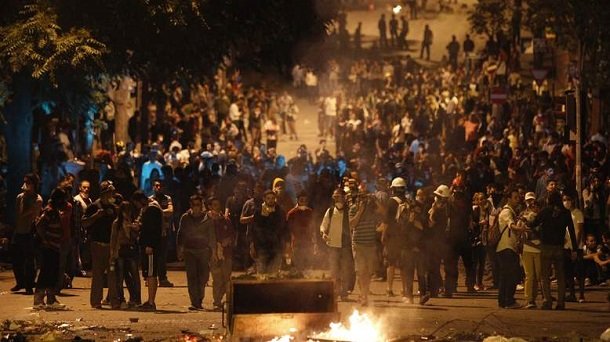
Thousands of anti-government protesters are gathering in Istanbul’s Taksim Square, ahead of the return of PM Recep Tayyip Erdogan from a North African tour
The economic response to the remarks was swift, with the stock market dropping nearly 5% after the prime minister’s announcement.
Since the protests erupted, four people including a police officer are reported to have died, thousands have been injured and hundreds arrested in the unrest.
Among those detained were seven foreigners from France, Germany, Greece, Iran and the US, Turkey confirmed on Thursday.
Protesters accuse Recep Tayyip Erdogan’s government of becoming increasingly authoritarian and trying to impose conservative Islamic values on a secular state.
His ruling Justice and Development Party has governed Turkey since 2002, winning a series of election victories.
Earlier this week, Deputy PM Bulent Arinc apologized for police violence in the original protest at Gezi Park.
He also met representatives from a protest group calling itself the Taksim Solidarity Platform (TSP).
The collective presented a list of demands, which included the dismissal of police chiefs, a ban on the use of tear gas, the release of detained protesters, the sacking of Istanbul’s governor, and the scrapping of the plans for the redevelopment of Gezi Park.
Opponents of the plan say the park is one of the few green areas left in central Istanbul.
But Recep Tayyip Erdogan has repeatedly said the project would go ahead, and that the historic Ottoman-era military barracks would be rebuilt on the site as planned.
The protests come as Turkey prepares to host an international conference focused on its relations with the EU on Friday.
Recep Tayyip Erdogan is to make the opening speech at the event, which will be attended by the EU’s Commissioner for enlargement, Stefan Rule, British ex-foreign minister Jack Straw and representatives from other member states.
France earlier condemned Turkey’s heavy-handed police response to the protests.
Negotiations with the EU have stalled in recent years because of concerns over freedom of speech, treatment of religious minorities, women’s and children’s rights, civilian control of the military and long-running tensions with Cyprus.
[youtube ZFgYCS_cmTQ]
[youtube GrEtOvfOQco]
Turkish protesters have demanded the sacking of police chiefs in Istanbul, Ankara and other cities over their forces’ violent responses to demonstrations.
They also rejected an apology by Deputy PM Bulent Arinc, saying his remarks “were reminiscent of a civil war”.
A group calling itself the Taksim Solidarity Platform (TSP) said it had handed a list of demands to Bulent Arinc.
The crackdown on protests over the redevelopment of a park in Istanbul last week triggered nationwide unrest.
Overnight, police in Istanbul again fired tear gas, water cannon and smoke grenades at protesters.
The demands presented by the Taksim Solidarity Platform on Wednesday included a ban on the use of tear gas, the release of detained protesters, and the scrapping of the plans for the redevelopment of Gezi Park, which is part of Istanbul’s Taksim Square.
“The steps the government takes will shape the events,” the TSP said after their meeting with Bulent Arinc on Wednesday.
On Tuesday, the deputy prime minister apologized to demonstrators who had been injured.
He said the original protests had been “just and legitimate” and that the “excessive use of force” by police had been wrong.
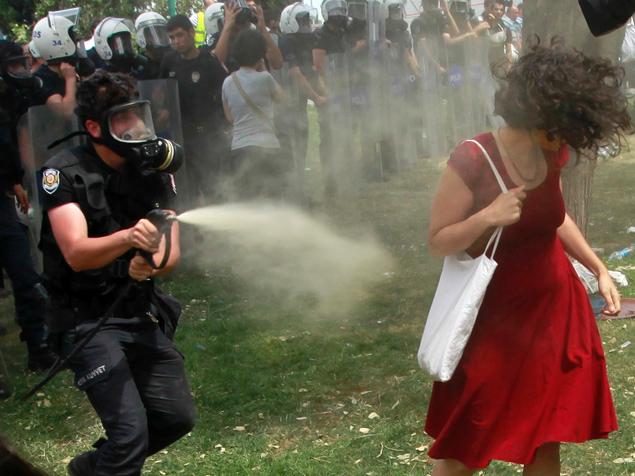
Turkish protesters have demanded the sacking of police chiefs in Istanbul, Ankara and other cities over their forces’ violent responses to demonstrations
Officials have confirmed that two people have been killed in the unrest.
One man died after being shot by an unidentified gunman in the southern city of Antakya. Another died after being hit by a car that ploughed into a crowd in Istanbul.
The Turkish Human Rights Association said more than 2,800 protesters had been injured across the country, many of them seriously, and that 791 had been detained, of whom “around 500” have since been released.
Bulent Arinc said that 244 police officers and 64 protesters had been injured, and more than 70 million Turkish lira ($37 million) of public damage had been caused.
Bulent Arinc’s conciliatory remarks contrasted with the tougher line taken by PM Recep Tayyip Erdogan, who has said the protests are undemocratic.
The state-run Anatolia news agency earlier reported that police had arrested 25 people for posting “misinformation” on Twitter.
An official from the opposition Republican People’s Party (CHP), Ali Engin, told Anatolia they were being held for “calling on people to protest”.
Recep Tayyip Erdogan said on Sunday that Twitter was a “menace” being used to spread “lies”.
The original protests began in Gezi Park on May 28 but soon mushroomed, engulfing several cities and becoming more political.
Demonstrators accuse Recep Tayyip Erdogan’s government of becoming increasingly authoritarian and trying to impose conservative Islamic values on a secular state.
The prime minister is still the most popular politician in the country, but he is discovering that a ruling style that his opponents say is autocratic has its limits.
Recep Tayyip Erdogan’s Turkey was seen as a runaway success by many in Europe and the Middle East; now it is looking tarnished, with deeper problems than its allies – and enemies – realized.
[youtube 3P2F8kFIi3I]
Turkish Deputy Prime Minister Bulent Arinc has apologized to protesters injured in demonstrations opposing the demolition of Istanbul’s Gezi Park.
The original protests over the redevelopment of Gezi Park were “just and legitimate”, he said, offering to meet the organizers.
Bulent Arinc called for the protests to end, saying they had been taken over by “terrorist elements”.
The protests have escalated into five days of unrest in cities across Turkey.
“The use of excessive force shown against the people who initially started this protest with the motive of protecting the environment was wrong. And it was unfair. So I apologize to those citizens,” Bulent Arinc said at a news conference in Ankara.
However, he added: “I do not think we need to apologize to those who create destruction of public property in the streets and who try to prevent the freedom of the people in the streets.”
PM Recep Tayyip Erdogan has taken a tougher line with protesters in his public comments, saying they are undemocratic.
He went ahead with a trip to Morocco and, speaking after his arrival there, insisted the situation was “calming down”.
“On my return from this visit, the problems will be solved,” he told reporters.
One union federation has begun a two-day strike in support of the protests.
The left-wing Kesk trade union confederation, representing some 240,000 workers, accused the government of committing “state terror”.
A second death in the protests has been confirmed by officials the southern city of Antakya.
Abdullah Comert, 22, a member of the youth wing of the opposition Republican People’s Party, was “seriously wounded… after gunfire from an unidentified person,” the governor’s office said, adding that he died later in hospital.
On Monday, the Turkish Doctors’ Union said 20-year-old Mehmet Ayvalitas was hit by a car on Sunday which ignored warnings to stop and ploughed into a crowd of protesters in the Mayis district of Istanbul.
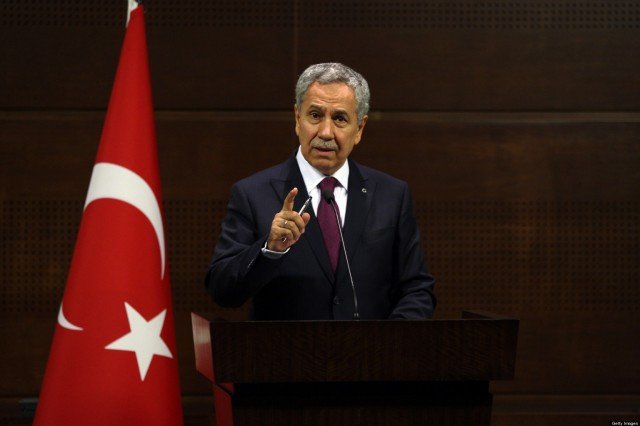
Deputy PM Bulent Arinc has apologized to protesters injured in demonstrations opposing the demolition of Gezi Park
Hundreds of protesters were reported to have gathered in the early hours of Tuesday in Ankara where they were police used more tear gas and water cannon.
Share values in Turkey were hit badly by the unrest on Monday, with the main share index falling by 10.47%, although it did recover some of the losses in early trading on Tuesday.
In a sign of continuing concern in Washington, US Secretary of State John Kerry spoke of “excessive use of force” by the police.
“We obviously hope that there will be a full investigation of those incidents and full restraint from the police force,” he said.
The protests began on May 28 over plans to redevelop Gezi Park near Taksim Square in Istanbul.
They soon mushroomed, engulfing several cities and including political demands.
Unrest was also reported on Sunday in the western coastal city of Izmir, Adana in the south and Gaziantep in the south-east.
Protesters accuse the Turkish government of becoming increasingly authoritarian.
They fear Recep Tayyip Erdogan’s Justice and Development Party (AKP) is trying to impose conservative Islamic values on the officially secular country and infringe on their personal freedoms, correspondents say.
His opponents see moves such as recent restrictions on the sale of alcohol and legislation last year which allowed children to enter Islamic schools at a younger age as proof of this agenda.
An investigation into hundreds of coup plot suspects has also been seen as undermining the influence of the military, which has traditionally considered itself as guarantor of the country’s secular constitution.
However, supporters of Recep Tayyip Erdogan point to the fact that he has been elected with a convincing majority, and that many Turks still back him.
Gezi Park:
- The demolition of Gezi Park – the issue which sparked Turkey protests – is a part of a wider urban redevelopment project in Istanbul
- The government wants to pedestrianise and ease traffic around Taksim Square; Kalyon Group, a company which has close ties with the government, has been contracted to carry out the project
- The project also includes building a shopping centre which PM Recep Tayyip Erdogan says would not be “a traditional mall”, but rather would include cultural centres, an opera house and a mosque
- The plan also includes rebuilding an Ottoman-era military barracks near the site and demolishing the historic Ataturk Cultural Centre
- The government has been making ambiguous and inconsistent statements about the project, which is causing concern among protesters who oppose replacing the green city park with grey concrete
[youtube tIpoynnNKhg]
[youtube gxq3_2xamD4]
Istanbul municipality plans to replace Gezi Park with a shopping center have sparked protests in Turkey’s largest city and beyond.
What began as a demonstration against the loss of green space has turned into a wider expression of anger against government policies. The excessive use of force by riot police has escalated tensions.
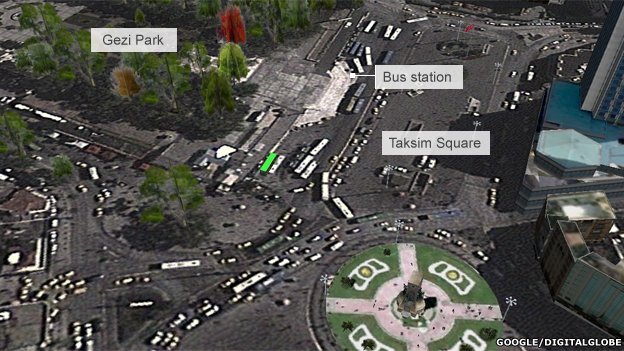
How Gezi Park and Taksim Square look now
The development of Gezi Park – an urban park in Taksim Square – is part of a wider urban redevelopment project in the city.
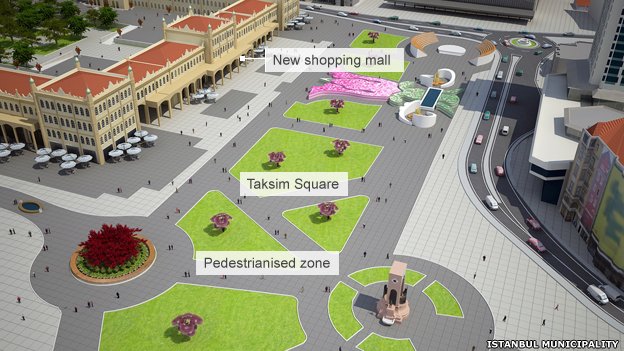
Plans for Gezi Park and Taksim Square
The government wants to pedestrianise and ease traffic around Taksim Square; Kalyon Group, a company which has close ties with the government, has been contracted to carry out the project.
Plans include building a shopping centre, which PM Recep Tayyip Erdogan says would not be “a traditional mall”, but would include cultural centres, an opera house and a mosque.
An Ottoman-era military barracks would be rebuilt near the site and the historic Ataturk Cultural Centre would be demolished.
Opponents of Recep Tayyip Erdogan’s plans say Gezi Park is one of the few green areas left in central Istanbul.
Prime Minister Recep Tayyip Erdogan says the continuing anti-government protests in Istanbul and across the country do not constitute a “Turkish Spring”.
At a news conference before a trip to Morocco, Recep Tayyip Erdogan said the protests were organised by extremists and accused the opposition of provoking “his citizens”.
For a fourth night, there have been confrontations between police and protesters with tear gas being used.
A protester has died after being hit by a taxi on Sunday, doctors say – the first fatality since the unrest began.
The demonstrator, 20-year-old Mehmet Ayvalitas, was hit when the car ignored warnings to stop and ploughed into a crowd of protestors in the Mayis district of Istanbul, said the Turkish Doctors’ Union.
On Monday evening, thousands of demonstrators again gathered in Taksim Square, the focus of the recent protests.
A helicopter, its searchlight shining onto the crowd, hovered overhead and tear gas wafted into the square.
Many protesters shouted “Tayyip, resign!” while waving red flags and banners and blowing whistles, according to the AFP news agency.
Police also fired tear gas again to disperse protesters near Recep Tayyip Erdogan’s office in the Besiktas district of Istanbul.
Earlier on Monday, protesters clashed with police in the capital, Ankara. Tear gas and water cannon were fired at hundreds of demonstrators in the city as around 1,000 protesters converged on central Kizilay Square.
In another development, a public sector trade union confederation, Kesk, says it will begin a two-day strike starting on Tuesday in support.
The left-wing confederation accused the government of being anti-democratic and carrying out “state terror”.
Shares in Turkey fell sharply as fears that the protests could continue took hold, with the main share index falling by 10.47%. The cost of insuring Turkish debt rose to a two-month high.
In a sign of continuing concern in Washington, Secretary of State John Kerry spoke of “excessive use of force” by the police.

PM Recep Tayyip Erdogan says the continuing anti-government protests in Turkey do not constitute a Turkish Spring
“We obviously hope that there will be a full investigation of those incidents and full restraint from the police force,” he said.
Recep Tayyip Erdogan said during a televised news conference: “There are those attending these events organized by extremists. This is not about Gezi Park anymore. These are organized events with affiliations both within Turkey and abroad.
“The main opposition party CHP has provoked my innocent citizens. Those who make news [and] call these events the Turkish Spring do not know Turkey.”
Meanwhile, Turkish President Abdullah Gul urged calm and defended protesters’ rights to hold peaceful demonstrations.
“If there are different opinions, different situations, different points of view and dissent, there is nothing more natural that being able to voice those differences,” he was quoted as saying by the Anatolia news agency.
“The messages delivered with good intentions have been received.”
Protesters say the Turkish government is becoming increasingly authoritarian.
They fear Recep Tayyip Erdogan’s Justice and Development Party (AKP) is trying to impose conservative Islamic values on the officially secular country and infringe on their personal freedoms, correspondents say.
Officials say more than 1,700 people have been arrested in demonstrations in 67 towns and cities, though many have since been released.
On Sunday night, protesters in Besiktas tore up paving stones to build barricades, and Istanbul police responded with tear gas and water cannon.
Mosques, shops and a university in Besiktas were turned into makeshift hospitals for those injured in the demonstration.
Several thousand people took part in the protest outside the recently decommissioned Besiktas football stadium.
Unrest was also reported on Sunday in the western coastal city of Izmir, Adana in the south and Gaziantep in the south-east.
Last week, the government passed legislation curbing the sale and advertising of alcoholic drinks.
The protests began on a small scale last week in opposition to plans to redevelop Gezi Park in Istanbul but have since taken on wider political demands.
The demonstrators say the park is one of the few green spaces in Istanbul, and object to the loss of public space for commercial purposes.
[youtube 2pEOQi73aN8]
Tens of thousands of Turks have staged a third day of protests across the country with police again using tear gas and water cannon in some areas, including in Istanbul, where crowds had converged on the prime minister’s office.
The protests were sparked by plans to build on Istanbul Gezi Park but have broadened into anti-government unrest.
Prime Minister Recep Tayyip Erdogan says the protesters are undemocratic, and said the development will go ahead.
He has accused opposition parties of provoking the demonstrations, which represents the most sustained anti-government unrest for a number of years.
Interior Minister Muammer Guler told state media more than 1,700 people had been arrested during protests in 67 cities, though many had since been released.
Hundreds of people are reported to have been injured in the clashes.
Protests over the demolition of Gezi Park to make way for the rebuilding of an Ottoman era barracks, reportedly to house a shopping centre, began on a small scale earlier this week.
Protesters said the park was one of the few green spaces in Istanbul, and were angry at the loss of public space for commercial purposes.
But after police used tear gas and water cannon were used to break up the protests, triggering accusations of excessive force, the numbers in Taksim Square, next to the park, rocketed.
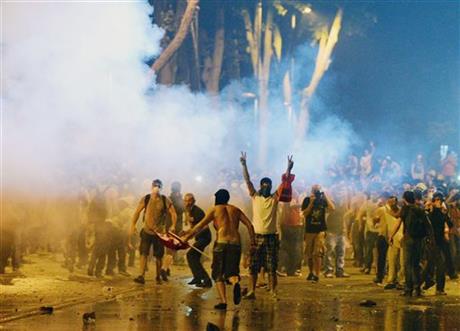
Clashes break out near PM Recep Tayyip Erdogan’s office
Ten of thousands of people took to the streets of towns and cities, many calling on the government to resign.
Police pulled out on Saturday afternoon, reportedly after President Abdullah Gul urged restraint, and by Sunday there was a carnival atmosphere.
But clashes continued, including in the Besiktas district, where police fired tear gas against protesters, some of whom built barricades or threw stones at Recep Tayyip Erdogan’s Istanbul office.
In Ankara, police fired tear gas at thousands of protesters who were attempting to march on the prime minister’s office there.
There were further reports of tear gas in Izmir, on the Aegean coast, and in Adana in the south.
The protests reflect the public’s anger with the Turkish government, which they believe is becoming increasingly authoritarian.
They fear Recep Tayyip Erdogan’s Justice and Development Party (AKP) is trying to impose conservative Islamic values on the officially secular country and infringe on their personal freedoms.
Last week the government quickly passed legislation curbing the sale and advertising of alcoholic drinks, which analysts say alarmed secularists.
Many felt insulted when he defended the legislation by calling people who drink “alcoholics”.
In a televised interview on Sunday, Recep Tayyip Erdogan, in power since 2002, denied accusations of being a dictator, saying he was “a servant of the people”.
He said the protests were being provoked by the opposition Republican People’s Party (CHP), and that those taking part were trying to undermine democracy, dismissing them as “a few looters”.
Recep Tayyip Erdogan also criticized social media, through which the protests have been co-ordinated and discussed, calling Twitter a “curse” and an “extreme version of lying”.
The crackdown has been condemned by rights groups and by the US.
[youtube SDkobEMA5z0]
[youtube Qu9Eh-LjLLk]
Turkish protesters have returned to the streets of Istanbul and capital Ankara after two days of unrest that have seen more than 1,700 arrests.
Largely peaceful protesters waved flags in Istanbul’s Taksim Square but there were reports police had fired tear gas in Kizilay Square in Ankara.
PM Recep Tayyip Erdogan said protesters were trying to undermine democracy.
The protests began over redeveloping a park near Taksim Square but broadened into anti-government unrest.
The protests represent the most sustained anti-government unrest for a number of years.
Correspondents say many people are fed up with the government, which they believe is becoming increasingly authoritarian and trying to take away some of their personal freedoms.
Early on Sunday morning, there had been some isolated clashes around the streets of Istanbul.
But the atmosphere later in the day was calmer and largely peaceful, with demonstrators milling about between burnt-out cars and gathering around fires.
There were music concerts in Taksim Square throughout the day, and that the thousands of protesters still there were calling for the gathering to remain peaceful. There was no apparent police presence.
One protester, Akin, told Reuters: “We will stay until the end. We are not leaving. The only answer now is for this government to fall. We are tired of this oppressive government constantly putting pressure on us.”

Turkish protesters have returned to the streets of Istanbul and capital Ankara after two days of unrest
More than 1,000 protesters also gathered in Kizilay Square in Ankara on Sunday, with reports police had fired tear gas and water cannon to disperse them.
The police reportedly responded after protesters moved towards the office of Recep Tayyip Erdogan.
In an interview on state television on Sunday, the Turkish prime minister said the protests were being provoked by the opposition Republican People’s Party (CHP), and that protesters were trying to undermine democracy.
“They have been removing pavestones and breaking the windows of local stores. Is this democracy?” he asked, dismissing the protesters as “a few looters”.
He rejected accusations that he was a “dictator”, saying he was a person who had “committed himself to serving his nation”.
Recep Tayyip Erdogan also criticized social media, through which the protests have been co-ordinated and discussed. He said Twitter was a “curse” and an “extreme version of lying”.
“I think social media as a whole is a pain in the side of society,” he said.
On Saturday, the prime minister had admitted there had been “some mistakes, extremism in police response”, but accused his opponents of using the anger over the Gezi Park issue to stoke up tensions.
Istanbul mayor Kadir Topbas tried to ease the tension, telling a local television station that “we have learnt our lesson”.
He regretted “not informing the people enough” about the Gezi Park redevelopment.
Shop owners, city workers and protesters have begun cleaning up after Friday and Saturday’s unrest and removing graffiti from walls and windows.
Interior Minister Muammer Guler said 90 demonstrations had taken place in 48 cities after the protests spiraled.
He said more than 1,700 people had been arrested – many had since been released but others would be put on trial, he told the Anatolia news agency.
Muammer Guler said one of the injured civilians was being treated in an intensive care unit at an Istanbul hospital.
Amnesty International claimed two people had been killed and more than 1,000 injured, though there was no confirmation of those figures.
Amnesty’s Europe director John Dalhuisen said: “The excessively heavy-handed response to the entirely peaceful protests in Taksim has been truly disgraceful.”
The US also expressed concern over Turkey’s handling of the protests.
Recep Tayyip Erdogan has been in power since 2002, and is expected to run for the presidency in 2014.
Some in Turkey have complained that his government is becoming increasingly authoritarian.
Recep Tayyip Erdogan ruling AK Party has its roots in political Islam, but he says he is committed to Turkey’s state secularism.
[youtube q2G3TavJ38E]
Turkish police have pulled out of Istanbul’s Taksim Square which has become the focus of the largest anti-government protest in years.
Thousands of people are in Taksim Square after days of unrest sparked by plans to redevelop nearby Gezi Park.
In recent days police have fired tear gas and water cannon several times to break up the demonstrations.
PM Recep Tayyip Erdogan has said police may have used excessive force but that the park development will go ahead.
Earlier on Saturday, he called for an end to the protests, saying Taksim Square “cannot be an area where extremists are running wild”.
In a defiant speech to the exporters’ union, Recep Tayyip Erdogan insisted plans to reconstruct an Ottoman era military barracks on the Gezi Park site would go ahead and that a shopping mall “might be built on the ground floor or a city museum”.
The protesters say the park is one of the few green spaces left in Istanbul, and that the government is ignoring their appeals for it be saved.
Their protests initially began as a sit-in in the park, but erupted in clashes on Friday as police fired tear gas to try to clear them out.
Correspondents say that what was initially a local issue has spiraled into widespread anti-government unrest and anger over the perceived “Islamisation” of Turkey.
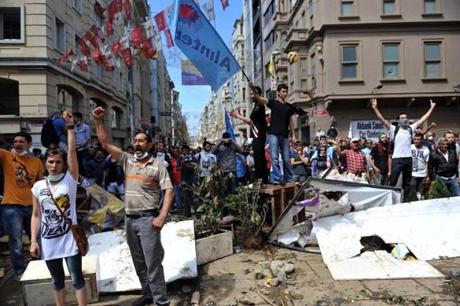
Thousands of people are in Taksim Square after days of unrest sparked by plans to redevelop nearby Gezi Park
One woman told Agence France-Presse: “They want to turn this country into an Islamist state, they want to impose their vision all the while pretending to respect democracy.”
Another, Oral Goktas, said the protest had brought together people from many different backgrounds.
“This has become a protest against the government, against Erdogan taking decisions like a king,” she told Reuters news agency.
The perception that police had been heavy-handed by firing tear gas and water cannon – a view adopted by many of the country’s mainstream media – also fuelled the unrest. Dozens of people have been injured in the clashes.
Turkey’s Hurriyet newspaper quoted police as saying 138 people were in custody.
Recep Tayyip Erdogan said there had been “some mistakes, extremism in police response”, while the authorities have insisted that any allegations of abuse of power by the police will be investigated.
In an apparent bid to reduce tensions, police and riot vehicles were withdrawn from the square on Saturday afternoon, and barricades removed, allowing thousands of people to enter the square.
The scene in the central square appeared to be peaceful, with protesters chanting slogans, dancing and waving banners, some calling for the government to resign.
However clashes continued in the Besiktas district of the city to the east.
Police were using tear gas and water cannon to hold back protesters near the Shangri-la hotel.
Recep Tayyip Erdogan has been in power since 2002 and some in Turkey have complained that his government is becoming increasingly authoritarian.
His ruling AK Party has its roots in political Islam, but he says he is committed to Turkey’s state secularism.
The US has expressed concern over Turkey’s handling of the protests and Amnesty International condemned the police’s tactics, saying: “The use of violence by police on this scale appears designed to deny the right to peaceful protest altogether and to discourage others from taking part.”
In his speech, Recep Tayyip Erdogan criticized the “preaching” of foreign governments, saying they “should first look at their own countries”.
[youtube yn8amL9PB44]
Turkish Prime Minister Recep Tayyip Erdogan has vowed to press ahead with controversial Taksim Gezi Park redevelopment that has sparked violent clashes in central Istanbul.
Recep Tayyip Erdogan said he would not yield to “wild extremists” and urged an end to the protests.
Clashes over Taksim Gezi Park in Istanbul began on Friday and continued there and in the capital, Ankara, on Saturday.
Correspondents say the local issue has spiraled into more widespread anger over perceived “Islamisation”.
Recep Tayyip Erdogan has been in power since 2002 and some in Turkey have complained that his government is becoming increasingly authoritarian.
His ruling AK Party has its roots in political Islam, but he says he is committed to Turkey’s state secularism.
Last week, Turkey’s parliament approved legislation restricting the sale and consumption of alcoholic drinks between 22:00 and 06:00.
In a defiant speech to the exporters’ union, Recep Tayyip Erdogan insisted that the park project would go ahead.
“We will rebuild the [Ottoman era military] barracks [at the site],” he said, without referring to the shopping mall that protesters fear will be located there.
Opponents say Gezi Park in Taksim Square is one of the few green areas left in central Istanbul.
Recep Tayyip Erdogan vowed order would be restored “to ensure the safety of people and their property”.
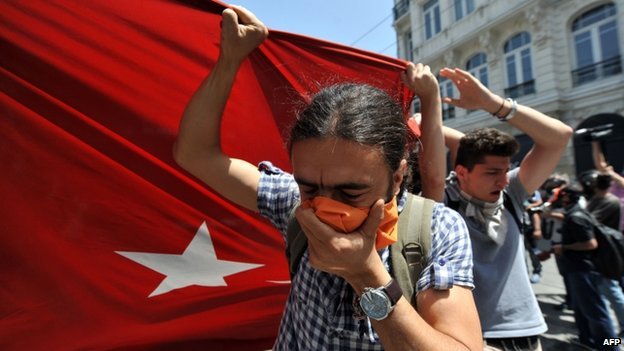
Turkish PM Recep Tayyip Erdogan has vowed to press ahead with Taksim Gezi Park redevelopment that has sparked violent clashes in central Istanbul
He said: “Police were there [Taksim Square] yesterday; they’ll be on duty today and also tomorrow because Taksim Square cannot be an area where extremists are running wild.”
Recep Tayyip Erdogan accused protesters of using the issue as an excuse to create tension and called on them to end their action immediately to avoid “further damage to visitors, pedestrians and shopkeepers”.
He said of the protests: “All attempts apart from the ballot box are not democratic”, adding that he could summon a million pro-government protesters if he wanted to.”
However, the prime minister did admit that the police response may have been “excessive” and that “necessary instructions” had been given to the minister of the interior and the governor of Istanbul.
The protest began on Friday as a sit-in over the redevelopment plans but escalated after police used tear gas. A dozen people were admitted to hospital and more than 60 people detained.
On Saturday, hundreds of demonstrators marched over the bridge connecting the Asian and European shores of Istanbul to try to reach the main square.
Police fired tear gas to try to disperse them and some protesters threw rocks.
Police also fired water cannon and tear gas in Taksim Square as demonstrators chanted “unite against fascism” and “government resign”.
Clashes were also reported in the Besiktas district.
One Istanbul resident, who gave her name as Lily, revealed that police had dropped tear-gas canisters from helicopters overnight.
“About half past one the entire city started to reverberate. People were banging on pots, pans, blowing whistles,” she said.
One woman protesting in Istanbul told Agence France-Presse: “They want to turn this country into an Islamist state, they want to impose their vision all the while pretending to respect democracy.”
In Ankara on Saturday, hundreds of demonstrators gathered at a park, many drinking alcohol in protest at the new restrictions.
Some chanting anti-government slogans tried to march on parliament but were dispersed by police.
Many postings on Twitter have complained angrily about the lack of media coverage of the protests within Turkey.
The US has expressed concern over Turkey’s handling of the protests and Amnesty International condemned the police’s tactics.
In his speech, Recep Tayyip Erdogan criticized the “preaching” of foreign governments, saying they “should first look at their own countries”.
[youtube z1fawWpwgCA]
 Prev1...567Next
Prev1...567Next  Page 6 of 7
Page 6 of 7


























